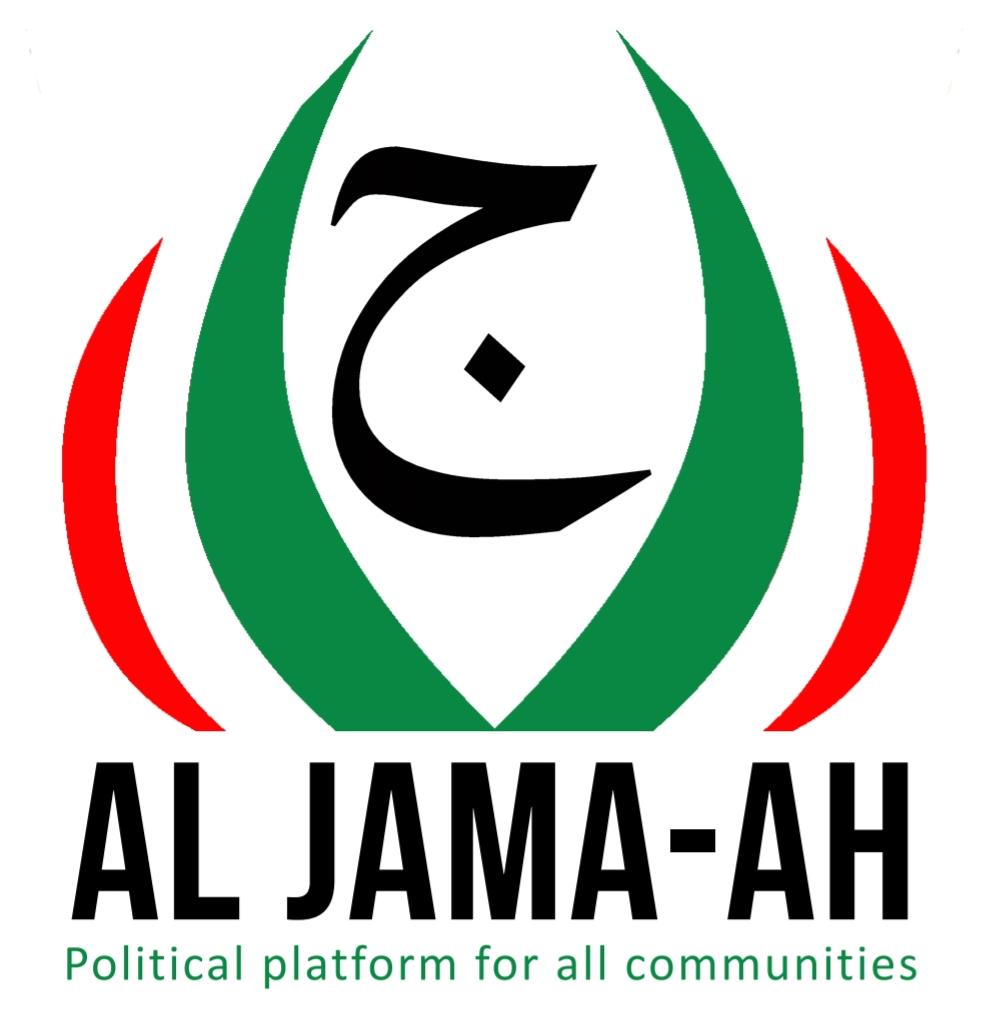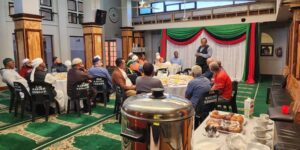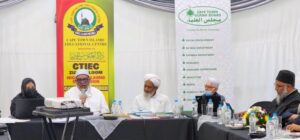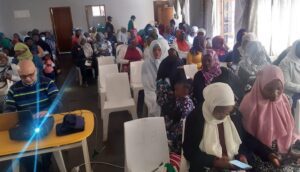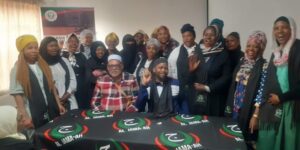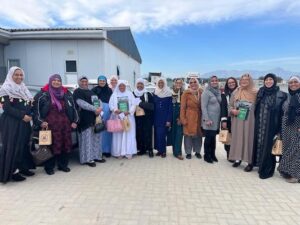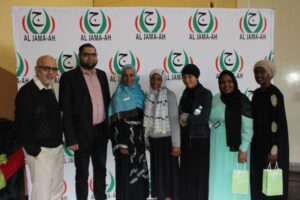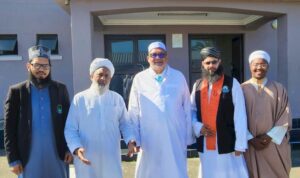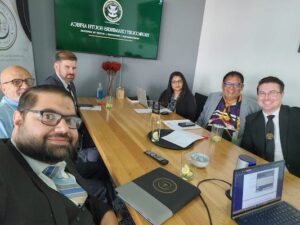VICTORY FOR MUSLIM WOMEN IN SOUTH AFRICA
MUSLIM MARRIAGES CAN NOW BE REGISTERED AT HOME AFFAIRS
Marriage Bill
IMPORTANT NOTICE
AL JAMA-AH FORCED TO HALT REGISTRATION OF NIKAH CERTIFICATES
MARRIAGE BILL UPDATE
DEC 2023
THE AL JAMA-AH Party has achieved its 2019 Election Promise made to South African Muslims that should the party win a seat in National Parliament; it would fight for the recognition of the Nikah
(Muslim marriage in accordance with Islam) which would restore the dignity of Muslim wives.
These amendments meant much to our women folk, who were married and given a Nikah (marriage) certificate, and the children, who were previously viewed as illegitimate; with these modifications, their respective statuses have radically changed; and this thus corrected an irregularity that the couples were ‘never married’ and that the children were borne ‘out of wedlock’.
For many centuries – during colonial and post-apartheid times- Muslim marriages were not recognised thus imposing many hardships on women and children. After 375 years of Islam in South Africa, the recognition of the Nikah is long overdue! Finally, the Nikah performed over the many centuries can now be added to the South African National Population Register along with births, deaths and divorces of Muslim wives and husbands.
The Registration of Muslim Marriages was finally approved by cabinet followed by a circular issued by The Department of Home Affairs on the 27 June 2023. Adding to the latter’s historical achievement by Al Jama-ah’s leader, Hon Ganief Hendricks, the Portfolio Committee on Justice that dealt with the Divorce Bill decided to amend it in accordance with the proposal made by him.
The party had ‘oversight desks’ at each of the four DHA (Mitchells Plain and Wynberg in the Western Cape; Harrison Street in Johannesburg and Umgeni Road in Durban), however there were teething problems. Hendricks stated that, “it has come to our knowledge that the Nikah marriage is being registered under ‘The Recognition of Customary Marriages Act’ instead of ‘The Recognition of Muslim Marriage’.“ He added that, “if left as is then in the near future, the Muslims might encounter major negative consequences in the years ahead; and this should be avoided at all costs.”
The DHA and the party, which are involved in this process, wish to ensure the process complies with ‘the agreement’ as well as with the 27 June 2023 Circular. Now for this issue to be smoothened out, the party’s legal counsel is engaging with the DHA officials, and soon thereafter, the party’s spokesperson will inform the Muslim community about the outcome.
IT’S OFFICIAL! Victory for Muslim women

The legal developments in the Muslim community in South Africa are a true testament to the power of advocacy and perseverance. Al jama-ah is excited to share the hard-fought victory for women and children in Muslim communities, and rightly so.
For many years, Muslim marriages in South Africa were not recognized by the country’s law systems, causing significant discrimination against the Muslim community. The Divorce Act of 1979 explicitly excluded Muslim marriages, which led to Muslim couples facing various obstacles with ending their marriages, such as seeking court protection orders, financial support, and custody of children.
The exclusion of Muslim marriages from the country’s legal system also deprived many Muslim women of their rights during marriage and divorce, such as property rights and maintenance. However, with the recent proposed amendments, the country is taking significant steps towards undoing this injustice and protecting the rights of Muslim couples and their families.
The amendments pushed by AL JAMA-AH to the Divorce Act remove discrimination and hardship for children born in a nikah marriage and wives facing talaq.
The Al Jama-Ah political party introduced two private member bills in late 2022, pushing for further changes to divorce and marriage laws. Mogamad Ganief Hendricks, the leader of the party, noted that without such changes, countless Muslim marriages and families would continue to suffer.
Amongst other crucial areas of amendments, clause one of the amendments is an insertion of a new definition of Muslim marriage recognised by the Constitutional Court Judgment to be part of South Africa’s common law. Clause 2 amends section 6 of the Divorce Act by providing safeguarding mechanisms for minors or dependents of a Muslim Marriage. Clause three of the bill amends section 7 of the Divorce Act by empowering a court to grant a divorce decree on the dissolution of a Muslim marriage to make an order regarding the redistribution of assets. Further, clause four amends section 9 of the Divorce Act to empower a court when granting a divorce, a decree on the dissolution of a Muslim marriage to give an order that patrimonial benefits of a Muslim marriage be forfeited in stipulated terms
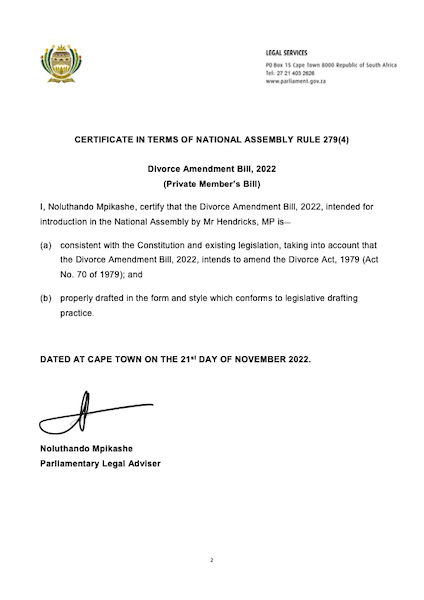 Al Jama-ah received a mandate from its voters in the 2019 national elections to submit private members’ Bills to get the Legislature to recognize Shariah personal law and a correct definition of a Shariah marriage. The efforts of the party’s single member of Parliament and party leader have borne fruits, and Al Jamaah has emerged as one of the foremost voices in protecting the legal rights of Muslim marriages in a predominantly Christian society.
Al Jama-ah received a mandate from its voters in the 2019 national elections to submit private members’ Bills to get the Legislature to recognize Shariah personal law and a correct definition of a Shariah marriage. The efforts of the party’s single member of Parliament and party leader have borne fruits, and Al Jamaah has emerged as one of the foremost voices in protecting the legal rights of Muslim marriages in a predominantly Christian society.
For centuries, Muslim women in South Africa have been subjected to abuse when it comes to their rights in getting married and, even more so, in the case of divorce. The amendments to the Divorce Act bring issues of freedom, justice, and equal rights to Muslim women—an incredibly significant victory in a predominantly non-Muslim society.
It is crucial to note that the 1994 democracy in South Africa has opened doors to accommodate all cultures and religions, as evidenced by the acceptance of the Muslim marriage bill—a bill that had not been recognized for 350 years. Women in a nikah can now approach the Divorce Court for their rights in terms of Shariah, and children born out of nikah now have the support of the Family Advocate.
Some key consequences of these amendments include the ability of the office of the family advocate to assist with the investigation and welfare and the best interest of minor children, ensuring that children born of Muslim marriage and their parents no longer suffer from inconsistencies and prejudice as they did under the previous Act. These developments have provided the Muslim community in South Africa with a significant legal victory that will undoubtedly go down in history.
The progress made by Honourable Hendricks and Al Jamaah is especially significant when considering the parlous state of human rights in the world, including South Africa. The Muslim electorate has placed their trust in him and his party to represent their needs, and he has fulfilled his mandate as their mouthpiece in Parliament.
Fighting for the rights of people is in the Honourable Hendricks’ blood – he comes from a family deeply involved in the struggle for a better country. When the sound of bullets echoed from Sharpville on March 21, 1960, it was necessary for the Muslim community to rise from the ashes. Qiblah, under the leadership of Imam Achmat Cassiem, rose to the occasion, followed by the South African Muslim Students Association, where Ganief Hendricks was a founding member.
Not to forget the Muslim Youth Movement and the Call of Islam, headed by Ambassador Ebrahim Rasool, Ganief Hendricks was the forerunner of non-collaboration with the old regime, a philosophy he implanted in the hearts of many Muslims. Inspired by the late Imam Haroon, who was brutally murdered in detention, it was obvious that Honourable Ganief Hendricks was left with no choice but to enlighten the youth of the struggle to a point of no return.
After many smaller Muslim communities tried to establish a Muslim political party, Ganief realized the importance of a genuine Muslim voice and established the Al Jamaah political party. The party has become a strong advocate for the rights of Muslim communities, fighting against discrimination and bias in a predominantly non-Muslim society.
In conclusion, the legal developments in the Muslim community in South Africa are a significant milestone in the fight for human rights. Treasure Media stands with women’s liberation and empowerment and aims to highlight and celebrate the contributions and challenges faced by Muslim women in a predominantly non-Muslim society. The legal victory for women and children in Muslim communities should be lauded and celebrated not only in South Africa but globally
Image: Lawyers at work: Al Jama-ah’s legal team consulted with Hon Ganief Hendricks on the Registration of Muslim Marriages. From l-r: Ahmed Azhar Allie ( intern), Hon Ganief Hendricks (Al Jamah-ah MP and leader), Adv Anton van Loggerenberg, Adv Yusuf Khan Dalwai and Markus Nieman (intern)
READ ALL ABOUT IT !
OUR AMENDMENTS ON DIVORCE BILL APPROVED BY CABINET
AL JAMA-AH’s four amendments to the Divorce Act 1997 have been approved by Cabinet last week. In 2022 the Party submitted two private members bills to Parliament calling for the recognition of Muslim Marriages and for amendments to the Divorce Act which will afford Muslims legal discourse in matters of dispute. The new Draft Marriages Bill will now be open for public comment.
“In June 2022, the Constitutional Court had found that the Divorce Act in its current form to be inconsistent with the Constitution as it excludes Muslim Marriages. The court found that a section of the Divorce Act is unconstitutional in that it unfairly discriminates against child of married parents and those of unmarried parents,” said Minister in The Presidency Khumbudzo Ntshavheni.
Of the five clauses proposed to amend unconstitutional sections of the Divorce Act, the four clauses proposed by Al Jama-ah are:
- Clauses 1 – insertion of a new definition of Muslim marriage recognised by the
Constitutional Court Judgement to be part of South Africa’s common law.
- Clause 2 – amends section 6 of the Divorce Act by providing safeguarding mechanisms for minors or dependants of a Muslim
- Clause 3 – amends section 7 of the Divorce Act by empowering a court to grant a divorce decree on the dissolution of a Muslim marriage to make an order with regard to the redistribution of
- Clause 4 – amends section 9 of the Divorce Act to empower a court when granting a divorce a decree on the dissolution of a Muslim marriage to give an order that patrimonial benefits of a Muslim marriage be forecited in stipulated
The amendments include Al Jama-ah’s proposed definition of a Muslim marriage under Section 1 of the Divorce Amendment bill: “A marriage concluded in accordance with Islamic Law, that is, Shariah, which regulates all public and private behaviour as derived from traditional customs (Al-Urf), the two primary sources, namely, the Quran and Sunnah (Prophetic model) and that uses juristic tools such as ijma (the consensus) of Muslim Jurists and the individual jurist’s qiyas (analogical deductions) to issue legal edicts.”
The proposed amendments will allow Muslim women to access the divorce court which will give them the same benefits and protection as minor and dependent children in civil marriages. Due to the non-recognition of Muslim marriages, many Muslim families have suffered because of the harm South African legal system has caused as regards Muslim marriages; in these, Muslim wives and their children were often left destitute, homeless, and penniless when the spouse (that is, the husband) dies or agrees to a divorce.
Discrimination
Muslim women have for many years face hardships due to the non-recognition of Muslim marriages. The discriminatory clauses not only denied Muslim women their rights as espoused in Islam, but also from the rights women of other faiths enjoy under the current South African civil law and the Constitution of 1996. In many cases women were left helpless as the existing law does not enforce the husband to fulfil his obligations to the wife and children according to Islam. Islam has granted women fundamental rights but due to the patriarchal social system women are being denied their rights.
The current civil law leaves women in cases of divorce impoverished despite their financial contributions to the marriage; they are easily alienated from the benefits of the Intestate Succession Act 81 of 1987 and the Maintenance of Surviving Spouses Act 27 of 1990.
“The non-recognition of Muslim marriages thus permits the persistent alienation of Muslim women from their rights provided for in Islam which impedes on their personhood and dignities,” says adv Fayruz Nagia.
The discrimination against Muslim women and the hardships they endure, were for the first time raised in by a Member of Parliament, Al Jama-ah’s leader Hon Ganief Hendricks. “This was Al Jama-ah’s 2019 Election Manifesto mandate from the Muslim community to pursue for the recognition of Nikah marriages so Muslim women can access the Divorce Court for their rights in terms of Shariah for their share of the estates at time of Talaq or death of a spouse,” says Hendricks.
This new bill will assist the office of the family advocate to assist with the investigation, welfare, and best interest of minor children; the help will be extended to the children born from a Muslim marriage as well as parents will no longer suffer under the inconsistencies and prejudice of the previous Act.
Rights in Shariah
Shariah puts great emphasis on Freedom, Justice, and Rights; however, these have been misunderstood by many despotic regimes in the Muslim world. They imposed certain aspects of Islamic Law and yet ignored many other aspects which made Muslims to only belief that which was propagated by despotic regimes. One cannot speak about Islamic Law or Shariah without referring to the three major issues which are emphasised in Islam, which is freedom, justice, and rights.
“Freedom meaning, not only Muslims but whoever is resident in the place where Islam is ruling, must be free. Freedom of conviction is a prerequisite for being Muslim. The concept of freedom is one of the imperatives in Shariah,” says Shaykh Ramadan Ahmed.
On the question of Justice, he says: “all the citizens of a state must be equal before the law and there is nobody who is above the law, no matter what position they occupy in society. Whatever is Right by nature, the state should fulfil its obligations towards its citizens. These are three major elements without which you can never talk about Islam in the context of the state,” he says.
PUBLIC PARTICIPATION ON PRIVATE MEMBERS BILLS
AL JAMA-AH’s SHURA:
PUBLIC PARTICIPATION ON THE REGISTRATION OF MUSLIM MARRIAGES INFORMATION SESSION
Islam encourages Muslims to decide on matters relating to their affairs through consultation with one another. The concept of Shura is viewed as a praiseworthy activity which plays a big role in the managing of the affairs of mosques, organisations, and institutions.
The Al Jama-ah Party made history when it won a seat in Parliament in the 2019 national elections; it did so with the support of many Muslim votes. The party’s 2019 Election Manifesto mandate from its Muslim constituency was to fight for the recognition of Muslim marriages. Al Jama-ah’s leader and Member of Parliament Hon Mogamad Ganief Ebrahim submitted a Private Members Bill (PMB) on the Registration of Muslim Marriages (RMMB) as well as amendments to the respective Maintenance Act and the Divorce Act 1997.
This was done after the party consulted widely; it met various organisations and groups throughout the country. In fact, prior to writing the PMB, it held a seminar with several women who were resident at IHATA, a shelter for abused women. These women gave testimonies to the abuse they suffered: domestic violence; Gender-Based Violence; economic-suffering, psychological-torture, and financial abuse from their husbands.
This sad reality gave Hon Hendricks the necessary armoury to submit his PMB with the hope to stop the suffering and abuse of Muslim women; spouses who were denied the right to access the Divorce Court because the Nikah marriage was not recognised by the democratically elected government.
Despite many ulama bodies and Muslim institutions reluctant or not willing to support the efforts of Hon Hendricks, this did not stop the party from giving effect to Shura and the role that it plays as a mechanism within the Muslim community, theological bodies, and social institutions. The party embarked on vigorous campaigns to lobby for support from theological bodies, social institutions, Muslim communities, and professionals to give comments and input on the bill.
Certain political parties were also lobbied for support, especially those who represent constituencies’ whose marriages are also not recognised as in the case of Hindus and African traditional marriages. The calls for public participation took place in various forms:
- Delivering a pre-khutbah (sermons) on the bills;
- Questions and Answer questions;
- Information Sessions;
- Through media interviews;
- Presentations to theological bodies and others;
- Small group discussions; and
- Al Jama-ah Times reports
In Tshwane Atteridgeville about 200 Muslim women gathered to attend a Master Class on Muslim Personal Law that was organized by Al Jama-ah Party. At the meeting, Hon. Ganief Hendricks, who was accompanied by senior party representatives, namely the Secretary General, Mr Faried Achmat, and MPL Western Cape representative, Maulana Khalil Brinkhuis; both engaged with those who attended.
Apart from Hon. Hendricks having made his inputs on the drafted Bill’s, he was supported by the party’s senior Researcher, Prof. Muhammed Haron; the latter presented a Master Class on the Bill’s as part of the MPL project.
Besides having benefited from the presentations, the women showed their interest to join the party with the purpose of taking up issues that affect them and others. In addition, they demonstrated their willingness to publicize the party’s sterling work. Towards the close on the day-long event, the party solicited their views on related matters such as domestic violence; and these, they eagerly shared knowing that the party would take their matters to Parliament. These ladies were spoiled with lunch as well as branded Al Jama-ah neck scarves and goodie bags.
There is no doubt that the process of Shura brought about some unity between Al Jama-ah and theological bodies and community organizations; it, of course, created more public awareness about the party and its willingness to work with the community across the country.
We encourage public participation: Please send your comments on [email protected] or visit our Website https://www.aljama.co.za/ to view the Registration of Muslim Marriages Bill.
AL JAMA-AH’S ELECTION PROMISE TO YOU!
AL JAMA-AH’S EARLY MANIFESTO FOR 2024 NATIONAL ELECTIONS
AS we mark the final days of the ‘Id-al-Adha (a day of sacrifice); a day which enjoys special meaning because it symbolizes ‘sacrifice’ in the full sense of the word. It marks the climax of the Muslim pilgrimage known as Hajj. For Muslims it is the fifth pillar of Islam that tangibly binds the three Abrahamic religious traditions. Because of its socio-spiritual significance, it is an obligatory act for all Muslims (male and female); only those are physically and financially able should perform this sacred ritual, at least, once in their lifetime.
Considering the fact that this pilgrimage is reaching its climax on the day of ‘Arafat, we ask the questions: What have we – as a Party – accomplish legally? How have we have fared politically? And in which way have we contributed to our nation socially? In responding to these, we – as proudly South African political Party – can say that we managed to socially ring-fence more than sixty villages across the country where we hope to make demonstrable changes through setting up small agricultural industries.
Politically, the Party has punched above its weight with the appointment of two of its counsellors – the one succeeding the other – as the City of Johannesburg’s Executive Mayor. And on the legal front, the Party’s hard work paid off. It set in motion the Private Members Bill (PMB) with the sole intention of returning the dignity to all our country’s women folk.
While it succeeded to amend the respective Maintenance and Divorce Acts, it also pushed the government to give due recognition to the Muslim marriage institution. Honourable MP, Mogamat Ganief Hendricks with his team made sure that government acknowledged the need to address these matters; and we thankful that they did. So, the Party did this not only for the Muslim community but for our nation.
But it should be recalled that while the Party was busy on different fronts, it has on its mind the 2024 national elections. It wanted to prove to the nation that it can undertake tasks and deliver them; it can channel its energies to serve all communities; and it can dedicate its times to address critical issues that affects all.
Factoring in these developments and looking ahead to 2024, AL JAMA-AH’s CEO Prof Muhammed Haron has released the Party’s election promise; one that specifically appeals to Muslims (along with others) to come out in their numbers on the day of the national elections in July 2024 to cast their vote for the Party; a Party that is here as a committed political stakeholder that wished to help the government to take the socio-political turn.
This year our Party celebrated its 16th birthday; a celebration that followed challenging issues and arduous years to gain a seat in the National Parliament, the highest tier of government. The Party made history when it became the first Muslim political party to secure its seat in Parliament during 2019. This achievement by its leader Hon Hendricks is tangible testimony of his sacrifices; for he had complete trust in the Almighty for having granted him the stamina and courage to persevere despite many odds that were stacked against him.
So, when he got the parliamentary seat on Muslim votes, it was indeed a highpoint; it was an achievement not only for Al Jama-ah but it was also the case for the Muslim community. Now even though many Muslim theological bodies and organizations do not wish to openly demonstrate their support and interest in the Party’s manifesto and activities, it too was a victory for them.
Thus far Hon Hendricks’ first term in Parliament demonstrated that he did not only set himself several major goals but he made certain that he accomplishes many of them as he adjusted to his position as MP; and, indeed, he did! At this point in time, the Party may rightfully boast that he delivered much more than that of other political parties that served more than one term.
On the question of achievement, allow one to return to the PMB that he generated as an example of his dedication to bringing about changes on the legal front. Since 2019, he steered the Party along a challenging course. He helped to realise the 2019 Election Manifesto mandate from its Muslim constituency to fight for the Muslim marriage’s (that is, the Nikah) recognition; a social institution that was performed in accordance with the rules of Shari’ah. Historically, the nikah was not given any form of recognition by the successive colonial, apartheid, and democratic governments. Each of them denied the Muslims their rights even though the Muslims – as a religious minority – formed an integral part of these societies over the centuries.
Their discriminatory policies caused much suffering for the Muslim women and their children; the battery of legislation that each of these governmental systems enacted literally and figuratively deprived them of their fundamental rights; this was either in respect of the estate of the late spouse or in the case where the annulment of the marriage (divorce: talaq) could not be proved. The negative outcome of these resulted in the women including their children to be destitute, homeless, and penniless.
Setting these aside and as the Party faces the future, its leadership is of the belief that should more Muslims vote for it in the 2024 national elections, then it has the potential to increase its representation in Parliament by more than one seat. But despite only having one seat in Parliament at present, Hon Hendricks has been a champion on various fronts in Parliament.
He, for example, showed a keen interest in small business development projects to get our deprived communities out of poverty and joblessness; he thus touched base with village communities to bring about the necessary transformation in the rural areas. And another example where he has made an impact as the Party’s leader is in the socio-legal sector; herein, he championed the cause of the country’s women. He has, in fact, vociferously argued for women’s rights and for the socio-economic rights of all communities.
Being the Party’s only MP, he realized the power he had in Parliament and the opportunities that came his way to make changes. Since the PMB (in this case, the Muslim Marriage Bill) opened up legal pathways, he sought the support and assistance of different groups. He reached out to designated advocates from Parliament’s Legislative Drafting Team, the financial support from the Speaker of Parliament and Al Jama-ah’s legal research team headed by Advocate Yusuf Khan Dalwai, the Party’s National Working Committee and its National Executive Committee; together all of them contributed to the Party’s ability to effect change; their collective sacrifices turned into a victory for the Muslim community in particular and the nation as a whole.
It fortuitously happened that during this sacred month of pilgrimage, the Minister in The Presidency Khumbudzo Ntshavheni announced on the 21st of June 2023 that Cabinet approved Al Jama-ah’s four amendments to the Divorce Act of 1997. The first amendment spelt out the definition of Shariah: “A marriage concluded in accordance with Islamic Law, that is, Shariah, which regulates all public and private behaviour as derived from traditional customs (Al-Urf), the two primary sources, namely, the Quran and Sunnah (Prophetic model) and that uses juristic tools such as ijma (the consensus) of Muslim Jurists and the individual jurist’s qiyas (analogical deductions) to issue legal edicts.” The approval of Al Jama-ah’s amendments to the Divorce Act of 1997 is a socio-legal game changer to say the least.
Hon Hendricks who is committed citizen has always laid stress on the relevance and importance of Shariah that complements in many ways the country’s Constitution; the reason for this is that Shari’ah, like the Constitution, puts great emphasis on Freedom, Justice, and Rights. And with this in mind, Hon. Hendricks and Al Jama-ah want to ensure that the Muslim women in particular and the nation’s women in general are given their dignity to righting the legal wrongs. Worded differently, using the legal channels to show them respect and to return them their rights!
AL JAMA-AH WISHES ALL MUSLIMS ‘ID-AL-ADHA MUBARAK!
Al Jama-ah Political Party and Legislation:
Opening Pathways, Making Waves
As a political party, Al Jama-ah has its constituencies at heart; it adopted this posture since it was established in 2007 despite the challenges that its leadership encountered. When Hon. MGE Hendricks stepped into Parliament as the party’s sole representative, he already had a ideas of what he needs to do.
From the moment Hon Hendricks took up his post as a Member of Parliament (MP), he made use of all opportunities to see how he can assist the Muslims (and groups from other communities) who voted for the party. It so happened that the Private Members Bill (PMB) came to life when he entered Parliament as an MP, and he then realized its inherent potential in changing the situation of communities through legislation.
Over the past few years, the nation and communities witnessed the efforts that were made by various stakeholders; these, however, were unsuccessful. Many of them, moreover, were sceptical and critically questioning the sincere efforts of Hon. Hendricks and Al Jama-ah’s team when they decided to embark on this sensitive but overdue project. Hon Hedricks was concerned about the dignity that our community and myriads of families have suffered because of the non-recognition of the Muslim marriage.
Several Muslim theological bodies had the audacity to express their negative views about the party’s input in this regard. They argued, among others, that since Hon Hendricks and his team were not theologians on what basis does the party have the right to (re)draft the Muslim Marriage Bill. Some of them were ignorant of the fact that the party engaged Muslim theologians; they were not left out.
They failed to mention that the party looked at the earlier contributions and that it did not construct one without perusing the previous one. It seems that the party’s critics were hopeful that it would fail in its efforts; little did they realize that the path that Hon Hendricks paved was a creative process and a game changing one.
Firstly, besides having set up a team to draft the bill, Hon. Hendricks made sure that the team consulted widely. And it has listed the names and groups in this four-pager to underline that it did not undertake this task without doing so. It was fully informed about the key process of shura.
Secondly, when the team started with its work and completed its draft, it too became aware that other Acts had to be amended to be in line with the Constitution. The outcome was that it suggested amendments to the respective Maintenance Act and the Divorce Act.
Thirdly, besides amending these Acts, the team was aware that several other ACTs will have to be amended too; but with its limited resources and restricted time-frames these will have to be changed at a later date after the 2024 National Elections.
Fourthly, while the party was still negotiating and discussing with the Department of Home Affairs officials about the draft MUSLIM MARRIAGE BILL, an agreement was reached to recognize Muslim marriages. It was agreed that a circular be issued. This development is indeed a victory for the party and the Muslim community.
Fifthly, since positive outcomes have been witnessed the party has already been thinking the formation of a Shari’ah court that would be spearheaded by both women and men qadis (judges); it has been idea that it had listed along with an arbitration and mediation mechanism to take marital and communal issues forward and leaving no one behind.
Lastly, amidst these outcomes, the Minister in the Presidency announced that Cabinet approved the amendments to the Divorce Act. This was after Hon. Hendricks urged Cabinet to fast-track it and consider this as a matter of Muslim faith; he informed the Cabinet that the Muslim women should be granted access to the Divorce Court to obtain relief since the Muslim alternative dispute resolution structure managed by, among others, the Muslim Judicial Council failed to address their matters satisfactorily.
Let us end by drawing on Adv F. Nagia’s comments; she underlined that the respected Minister’s announcement was a land mark decision. For the record, it reinforced the view that the party has not only seriously responded to communal concerns but it has made and continues to make socio-legal waves that will benefit millions in our nation.
SHAYKH DEBUNKS NEGATIVE NARRATIVE OF SHARI’AH
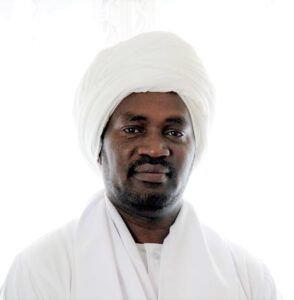 From the very early period soon after the collapse of the Khilafah (caliphate), Muslims have misunderstood Shari’ah; this may be attributed to rule of brutal regimes (with a few exceptions) different parts of the Muslim world
From the very early period soon after the collapse of the Khilafah (caliphate), Muslims have misunderstood Shari’ah; this may be attributed to rule of brutal regimes (with a few exceptions) different parts of the Muslim world
The rational of Al-Khilafah Al Rashida (righteous caliphate) started from the Prophet’s (s) time, and it ended with the death of ‘Ali ibn Abi Talib (r). When the Umawi dynasty ushered in their reign soon after, the era of political despotism in Islamic history was initiated. Through the course of history, many tyrannical governments reigned the Muslim world; they imposed certain aspects of Islamic law. In the process, these regimes ignored many other important aspects of Islam, such as justice, freedom, and rights. This selective approach continued over the centuries.
In contemporary Arab states, the dictatorial governments (with a very few exceptions) forced religious authorities to portray Islam in a particular manner; they did so as they interpreted it and not as Islam should be comprehended as a ‘way of life’. These religious authorities, in fact, played a key role in legitimising the tyrannical regimes’ rule. Being on the autocratic rulers’ payroll, these shuyukh turned a blind eye to the looting of resources in the Muslim world. The world witnessed the emergence of political elites, family monopolies, and military cartels that took advantage of their countries’ resources, while the majority of their societies are left living in abject poverty and ignorance.
Considering these happenings in the Muslim world and when reflecting on the status of Islamic law (Shari’ah), none of the Muslim societies can refer to the three major imperatives (namely, freedom, rights, and justice); concepts that give true meaning and sense to the word Shari’ah. The first of the three is: freedom; it word means that an individual exercises his/her free will to determine his/her own choices in life, including to be Muslim or not.
For this reason, Islam lifts the burden of responsibility from the minor, the insane, and the one sleeping, let alone the one who is in captivity or whose freedom is usurped. No person is accepted into the fold of Islam ‘as the right way of life’ without being ‘free to choose.’ This concept is thus one of the key imperatives of Shari’ah. The difference, however, between freedom in Islam and freedom in the Western secular systems is that there are boundaries; for if everyone is to exercise absolute freedoms, then we will end up trespassing other people’s rights. In this regard, Islam puts a limit to individual freedoms lest he/she infringes on the societal ‘common good.’
The second imperative is justice. Islam considers ‘justice’ as an absolute value and is critical to societal prosperity, peace and safety. The Qura’nic verse that talks about justice is amazing! “O you who have believed, be persistently standing firm in justice, witnesses for Allah, even if it be against yourselves or parents and relatives. Whether one is rich or poor, Allah is more worthy of both. So follow not [personal] inclination, lest you not be just. And if you distort [your testimony] or refuse [to give it], then indeed Allah is ever, with what you do, Acquainted.” [Quran 4:135].
The third imperative is the fulfilment of ‘rights;’ not only the rights of people, but also the rights of animals and all other creatures. Khaliph Omar (r) said: “If a mule in Baghdad stumbled on the road, I know Allah will ask me for it because I did pave the road for it.” Justice means that all citizens in the state must be equal before the law, and nobody is above the law, no matter what position they occupy in society.
The third imperative is the issue of ‘rights.’ Whatever is right by nature must be fulfilled, meaning that the state should fulfil its obligations towards all the citizens; and the citizens should fulfil their obligations towards the state. So, these are three significant imperatives without which one cannot talk when discussing Islam in relation to the state.
Shari’ah organises society, in terms of relationships, rights, obligations, and social interactions. In a nutshell, the reference is to mu’amalat (that is, transactions). In other words, Shari’ah considers society as its central focus and any Muslim government is considered but a servant of society; it is subject to checks and balances without any sacredness associated with it. A ruler is thus subject and open to criticism; so, questioning his(/her) rule if need be and this even includes a possible dismissal from office.
The responsibility of the state in Islam is not to ‘propagate’ Islam, for this is the role of society. The state’s responsibility is to maintain safety, apply justice, and fulfil its obligations to all its citizens; especially in the way the citizens want. In other words, the state acts according to the will of society, not the will of an elite, be it military, familial, or political.
There is a lot of talk these days about Islam in the context of the state among the Muslim jurists. The version of Islam, however, portrayed by repressive regimes remains a dominant force; this is in the mindset of many Muslims and non-Muslims. So, when we talk about Shari’ah, we do not converse about ‘hudud’ (penal laws), we talk about the organisation of society at large in everything pertaining to their life.
(written by Shaykh Ramadan Ahmed Birima, Executive Director of Verulam Islamic Institute.)

